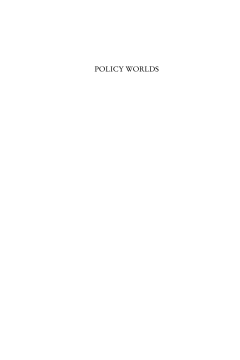
Additional Information
Book Details
Abstract
There are few areas of society today that remain outside the ambit of policy processes, and likewise policy making has progressively reached into the structure and fabric of everyday life. An instrument of modern government, policy and its processes provide an analytical window into systems of governance themselves, opening up ways to study power and the construction of regimes of truth. This volume argues that policies are not simply coercive, constraining or confined to static texts; rather, they are productive, continually contested and able to create new social and semantic spaces and new sets of relations. Anthropologists do not stand outside or above systems of governance but are themselves subject to the rhetoric and rationalities of policy. The analyses of policy worlds presented by the contributors to this volume open up new possibilities for understanding systems of knowledge and power and the positioning of academics within them.
Cris Shore is Professor of Social Anthropology at the University of Auckland, New Zealand.
“The editors break new ground in offering policy as one lifeline to anthropologists struggling to give shape to multi-sited ethnography…This book achieves what it sets out to do. These accounts show that policy is good to think with, that theories of governmentality should encompass contestation to be convincing, and that ‘policy’ deserves further study.” · Journal of the Royal Anthropological Institute
“The book offers both unsettling and highly inspirational reading material, especially for academics emerging from the world’s metropolises. It raises issues that are frequently overlooked and which represent unavoidable starting points for those doing anthropology today in the Antipodes and elsewhere.” · Social Anthropologie/Anthropologie sociale
“This volume offers an indispensable point of reference for any methodological and theoretical planning and execution of cultural- and social-anthropological research into the fields of politics and policy.” · H-Soz-u-Kult
“The value of the very idea of focusing on policy processes rather than on politics lies in that it is at the level of policy that a more comprehensive light can be shed on the always less ‘local’ and always more multifarious, subtle, flexible and dissimulating ways in which contemporary power shapes our worlds. This is why, after reading this book,... one recognizes the bounded coherence of its highly dissimilar contexts and ethnographic stories.” · Ethnic and Racial Studies
“The currency of this book adds to the validity of argument being made by applied anthropology’s advocates and supports their case in the ongoing applied/theoretical divide…Policy Worlds is a valuable addition to this emerging field of anthropology.” · Anthropological Forum: A Journal of Social Anthropology and Comparative Sociology
“An outstanding contribution to the anthropological understanding of public policy… A very polished, coherent project, ably edited.” · Susan Greenhalgh, University of California, Irvine
“The volume represents an emergent subfield of anthropology coming of age in some ways; it will teach very well indeed and will certainly prove an invaluable book to think with and through… I was consistently impressed by the quality, coherence, and interest of the articles in themselves. Each was substantively fascinating, methodologically thought-provoking, and clearly linked to the others.” · Don Brenneis, University of California, Santa Cruz
Davide Però is Lecturer in Sociology at the University of Nottingham.
Susan Wright is Professor of Educational Anthropology at the Danish School of Education, Aarhus University, Denmark.
Table of Contents
| Section Title | Page | Action | Price |
|---|---|---|---|
| Policy Worlds | i | ||
| Contents | v | ||
| Introduction - Chapter 1 - Conceptualising Policy: Technologies of Governance and the Politics of Visibility | 1 | ||
| Section I - Studying Policy: Methods, Paradigms, Perspectives - Introduction | 27 | ||
| Chapter 2 - Illuminating the Apparatus: Steps toward a Nonlocal Ethnography of Global Governance | 32 | ||
| Chapter 3 - Politics and Ethics: Ethnographies of Expert Knowledge and Professional Identities1 | 50 | ||
| Chapter 4 - Peopling Policy: On Conflicting Subjectivities of Fee-Paying Students | 68 | ||
| Chapter 5 - ‘Studying Through’: A Strategy for Studying Political Transformation. Or Sex, Lies and British Politics | 86 | ||
| Chapter 6 - What was Neoliberalism and What Comes Next? The Transformation of Citizenship in the Law-and-Order State | 105 | ||
| Section II - Studying Governance: Policy as a Window onto the Modern State - Introduction | 125 | ||
| Chapter 7 - Intimate Knowledge and the Politics of Policy Convergence: The World Bank and Social Security Reform in Mexico | 130 | ||
| Chapter 8 - Shadow Governing: What the Neocon Core Reveals about Power and Influence in America1 | 151 | ||
| Chapter 9 - Espionage, Policy and the Art of Government: The British Secret Services and the War on Iraq | 169 | ||
| Chapter 10 - The (Un)Making of Policy in the Shadow of the World Bank: Infrastructure Development, Urban Resettlement and the Cunning State in India | 187 | ||
| Chapter 11 - Sweden’s National Pension System as a Political Technology | 205 | ||
| Section III - Subjects of Policy: Construction and Contestation - Introduction | 223 | ||
| Chapter 12 - The Case of Scanzano: Raison d’État and the Reasons for a Rebellion | 227 | ||
| Chapter 13 - Migrants’ Practices of Citizenship and Policy Change | 244 | ||
| Chapter 14 - Integration Policy and Ethnic Minority Associations | 264 | ||
| Chapter 15 - The Elephant in the Room: Multistakeholder Dialogue on Agricultural Biotechnology in the Food and Agriculture Organization1 | 282 | ||
| Afterword - Chapter 16 - A Policy Ethnographer’s Reading of Policy Anthropology | 300 | ||
| Notes on Contributors | 315 | ||
| Index - Index of Names | 319 | ||
| Index of Subjects | 325 |
